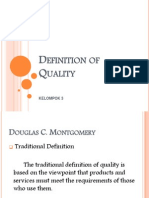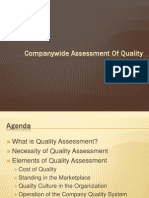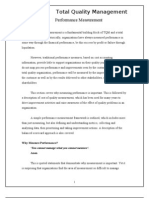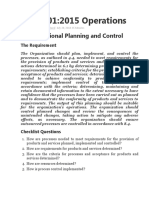Lessons Learned PDF
Lessons Learned PDF
Uploaded by
Amira NabillaCopyright:
Available Formats
Lessons Learned PDF
Lessons Learned PDF
Uploaded by
Amira NabillaOriginal Description:
Original Title
Copyright
Available Formats
Share this document
Did you find this document useful?
Is this content inappropriate?
Copyright:
Available Formats
Lessons Learned PDF
Lessons Learned PDF
Uploaded by
Amira NabillaCopyright:
Available Formats
Lessons learned web briefing v1.
0 3rd April 2012
APM Web Briefing - Lessons Learned
Introduction In project management we rarely seem to apply Lessons Learned - Why does our profession continue to make the same mistakes? Lessons Learned (both good and bad) can possibly be the most powerful project management tool available. The case for change In their research on what helps projects to succeed and what contributes to failure, Cranfield University School of Management found that the biggest differentiating factor between organisations that generally succeed with their projects and those that don't is "the willingness to publish and distribute lessons learnt". The knowledge and project management literature suggests that lessons learned processes are rarely applied. When they are applied they do not work well and they fail to deliver the intended results. Factors related to culture, people and their behaviour are those most likely to negatively influence the dissemination of Lessons Learned in an organisation. The project management publication PM World Today recently posted an editorial on Lessons Learned but Knowledge Lost (Pells 2011). Wideman (2011, p.1), a globally recognised project management expert stated: ...in spite of all the technology that is available to us today, we have not yet found a presentation format that captures the essence of this wisdom in a way that is relevant to future usage, readily searchable and easy to store. ...we have a serious cultural problem. ...we are probably condemned to continue to throw away the valuable resources. When and how to capture lessons learned We should not wait until the end of a project to carry out Lessons Learned. The danger of waiting until the end of a project to identify, capture and analyse lessons is that most project team members will already be focussed on the next project. Project momentum will have slowed down and most of the team will see this as a 'box ticking' exercise. As a result, only a fraction of the lessons that could be valuable to future projects are recorded and passed on. Even if an organisation has an effective method of communicating its lessons and learning from them, the most important element (identifying and capturing Lessons Learned) will have been compromised. Projects are generally split into a number of phases, milestones or gates and will overlap with other projects that are approaching the same phase in their project life cycle. Lessons Learned Reviews should be carried out at the end of each formal phase of the project and any learnings rapidly utilised both within the project being reviewed and in other related projects. Setting up a Lessons Learned log during the project start-up will help to establish the process as a core part of project management. Encouraging its use, and regularly reviewing it as part of the risk management process will also make it more meaningful and relevant to the work of the team. Ongoing capture of learnings as you go will also make it a lot easier to incorporate Lessons Learned in the end of project report.
Lessons learned web briefing v1.0 3rd April 2012
How and when to share lessons learned It is not enough to close out the project and to create a Lessons Learned report - the reports have to be made available to others in a way that makes them want to read and apply the lessons. The key to this is effective communication: Organising the critical information in an easy to understand way that that makes its relevance apparent. Ensuring that the different stakeholder groups are aware that the information is available, and that they know where to find it. Presenting the information in such a way that people can quickly extract it and turn it into useful actions. The best way to prevent the same mistakes being repeated is to embed new learnings into the relevant organisational processes (see next section). Where Lessons Learned do not relate to a specific process but may benefit future projects, helpful prompts can be prepared in the form of published guides or aide memoires. The success of passing on Lessons Learned in a written form will depend on the skill of the writer e.g. dry history books vs. those that bring the past dramatically to life. A large amount of knowledge on lessons will always remain with the individuals involved: what can actually be captured in a report is only a small percentage of the whole. Therefore, when the content of a Lessons Learned report appears useful for a current project, it is a good idea to followup with a conversation with the subject matter expert involved in generating the Lesson Learned. The only way real learning gets shared is through conversation. The trick from a business point of view is to enable that conversation. Getting people together face-to-face is the ideal way to do this. Telephone conversations are a valuable alternative. E-mail or discussion forum dialogues can be useful. Social media such as twitter, blogs etc. have a great potential for enabling conversation and therefore the ability to share knowledge or lessons. A key arena for the effective sharing of Lessons Learned is a community of practice (a group or network where people are brought together by a common interest) as a lot of the context of the learning will be understood, relationships can be built which will encourage openness, and interest in avoiding repeated mistakes will be at its highest. A forum of project managers within a company is an example of a community of practice. Project management forum meetings could have an agenda item to share lessons learned from all projects and from the whole team. These lessons should be positive ones as well as negative ones. Sharing the lessons will heighten awareness of problems, help people spot where they are experiencing the same thing and find solutions to prevent them from happening again. It will also allow those involved to highlight the good things that are happening as opposed to just focusing on the problems. Adoption Issues, motivation and ways to gain adoption A critical step for new projects is the review of relevant Lessons Learned. PRINCE2 does mandate it, but does it really happen in a meaningful way? In problem situations, the PM is very rarely challenged as to their awareness of whether a given problem had occurred on a similar project, whether it was therefore foreseeable, and to what extent had they taken measures to avoid its recurrence. Perhaps more focus on holding project managers to account in this way would result in adopting Lessons Learned processes more effectively.
Lessons learned web briefing v1.0 3rd April 2012
A potential issue for Lessons Learned is that there are personalities involved and/or an environment which is not conducive to working this way. In many instances a project teams ability to implement lessons will be outside its influence: the lessons may relate to an overarching process or they may just be too late for that project to adopt. For instance, corporate procedures might have been developed by another part of the business. They may have been applied indiscriminately to the entire organisation and they may be completely inappropriate for the project in hand. In these circumstances the problems are often absolutely foreseeable but occur anyway because the business mandates adherence to their procedures. Even if the business does not mandate adherence, it is often extremely difficult to obtain permission to deviate from those procedures. The Lesson Learned process therefore needs to consider who is responsible for taking the lessons forward and unblock the road to improvement. There is often a perception when a new project is set up especially if preceding projects have been problematic - that a conscious effort should be made to wipe the slate clean. This usually means an entirely new team (immediate lack of continuity and no first-hand experience of what went before) with new opinions about what will work and what wont. Too much reference to an earlier unsuccessful project is generally viewed as not a good thing, so even if a Lessons Learned report does exist it may never be looked at. In such situations it is little wonder that the same mistakes are made again, and even worse, mistakes are made on the new project in areas which were successful on the earlier project. In large organisations project managers can be competitive with a real desire to improve upon others successes with project managers actively attempting to establish what went well and what could have gone better and making tweaks to an existing formula. However this competitiveness could result in an adversarial approach with project managers deliberately adopting a completely different approach to that of a colleague (rival?) so as not to be seen to be doing the same thing, regardless of how successful the colleagues project may have been. More worryingly this rivalry may result in a successful project manager actively avoiding to pass on good points to others, or to flag up obvious pitfalls. In addition, if project metrics are translated into performance measures this can exacerbate the competitiveness between project managers and create a negative culture discouraging knowledge sharing. Making effective use of Lessons Learned is a cultural trait the alternative and easier option is to sweep problems under the carpet. However, the trigger to invest in learning from mistakes (and successes) has to be based on individual experience. One that highlights the value gained from learning lessons. We remember to go and write Lessons Learned reports far more often than we go and look at someone elses. Experience, being the tough teacher it is, means that there is a good chance you remember your own lessons, so there is even a temptation to not write them down nobody looks at them anyway do they? Edited by John Riddell and Elisabeth Goodman, with contributions from Adrian, Wilson Chiu, Stephen Duffield, Colin Hewson, James N, Neilgee67, Paul Rayner, Simon Springate, and Pat W, and input from Mark Hopkins 3, Phillip Lo Castro, Oldloggie, Marian, Scott Walkinshaw, Graham Woodward, Richard E Renshaw.
Lessons learned web briefing v1.0 3rd April 2012
See the original discussion at http://www.apm.org.uk/content/lessons-learned. About the editors Elisabeth Goodman is the owner and Principal Consultant of RiverRhee Consulting and a full member of APM. She has 25 years' experience in Pharmaceutical R&D, where she has held management roles in information and library management, and internal training and consultancy roles supporting business teams on a global basis. Elisabeth is an experienced and certified practitioner in change management, Lean Six Sigma, MBTI, and an expert in knowledge management, with a proven track record in improving team performance and leading business change projects. elisabeth@riverrhee.com, http://www.riverrhee.com, 07876 130817 John Riddell is an Associate with RiverRhee Consulting and a full member of APM. He has held technical, operational and project management roles in pharmaceutical manufacturing working with both small and large teams from a local to a global basis. John is a certified practitioner in Lean Six Sigma and is highly experienced in knowledge management. He has developed a successful programme to coach leaders in developing teams that have multiple cultures and are spread across global locations. john@riverhee.com, 07765 157363. Web briefings Web briefings are the developed from the APM Community, an online community of project professionals. They result from discussions and questions asked within the community, the content is developed from users responses and edited by APM. Web briefings are constantly evolving within the online community and are intended as a guide to issues within the profession. See all APM web briefings.
You might also like
- EY Performance Control EnvironmentDocument10 pagesEY Performance Control EnvironmentIndra WantoNo ratings yet
- 8 The Teacher As A Curriculum Designer - Lesson 1Document23 pages8 The Teacher As A Curriculum Designer - Lesson 1Mark Warren Atienza Revellame100% (3)
- Axis Education More Functional Skillbuilders EnglishDocument12 pagesAxis Education More Functional Skillbuilders Englishkentembz100% (1)
- MOW Quality Management Plan - TemplateDocument9 pagesMOW Quality Management Plan - Templatezae nuddinNo ratings yet
- Integration (PPT) - Chapter 4 PMBOKDocument13 pagesIntegration (PPT) - Chapter 4 PMBOKEric GunnerNo ratings yet
- 2.1.6.validate Scope TemplatesDocument2 pages2.1.6.validate Scope TemplatesAssad AssadNo ratings yet
- Client Communication TrackerDocument2 pagesClient Communication TrackerJindal HydraulicsNo ratings yet
- Project Management and ISO 9001Document6 pagesProject Management and ISO 9001api-19810590100% (4)
- Module Wise Deliverables and Project Plan - IsO 17025Document2 pagesModule Wise Deliverables and Project Plan - IsO 17025Vinay YadavNo ratings yet
- SOW Combined ScienceDocument130 pagesSOW Combined SciencezafiharoNo ratings yet
- Stanford Binet IntelligenceDocument3 pagesStanford Binet Intelligenceathirah0% (1)
- Definition of QualityDocument11 pagesDefinition of QualityHerry SinagaNo ratings yet
- Quality: To Meet Product or Service Specifications and ExpectationsDocument13 pagesQuality: To Meet Product or Service Specifications and ExpectationsmaelikahNo ratings yet
- CH 2Document18 pagesCH 2suresh84123No ratings yet
- PMF-project Quality ManagementDocument41 pagesPMF-project Quality Managementabdella.whateverNo ratings yet
- Lessons Learned PDFDocument1 pageLessons Learned PDFYasir_Wafi_1101No ratings yet
- Project Management Atkins' Way' Tata Consultancy Services Ltd. - A Case StudyDocument18 pagesProject Management Atkins' Way' Tata Consultancy Services Ltd. - A Case StudyPrasannaNo ratings yet
- Project Charter TemplateDocument6 pagesProject Charter TemplateAs y.kNo ratings yet
- QUALITY MANAGEMENT PLAN TEMPLATE v0.1Document30 pagesQUALITY MANAGEMENT PLAN TEMPLATE v0.1Roqaia AlwanNo ratings yet
- Appendix 9.2 - Training Need Assessment (TNA) and Training MatrixDocument2 pagesAppendix 9.2 - Training Need Assessment (TNA) and Training Matrixshahed olvinNo ratings yet
- Training Manual Template 31Document4 pagesTraining Manual Template 31ARIEZ HAZARIL BIN AB.LLAH -No ratings yet
- Analysis Report TemplateDocument2 pagesAnalysis Report Templatemounit121No ratings yet
- Management & Control of QualityDocument2 pagesManagement & Control of QualityDeepak Singh NegiNo ratings yet
- What Are The Most Important Key Performance Indicators For Document ControllersDocument3 pagesWhat Are The Most Important Key Performance Indicators For Document Controllerswhalet74No ratings yet
- Quality Management Plan (Large Projects) : Template and GuideDocument17 pagesQuality Management Plan (Large Projects) : Template and Guidesreekanthsasidharan100% (1)
- Quality Assurance For Service IndustriesDocument16 pagesQuality Assurance For Service IndustriesDr Srinivasan Nenmeli -K100% (11)
- Certification Program OverviewDocument34 pagesCertification Program OverviewliberrimoNo ratings yet
- PMROadTrip PMBOKIndexToInputsOutputsDocument12 pagesPMROadTrip PMBOKIndexToInputsOutputsNancyNo ratings yet
- Unit 9 Project Stakeholder ManagementDocument14 pagesUnit 9 Project Stakeholder ManagementTemesgen ZereabrukNo ratings yet
- Each Slide Contains Topics To Be Covered in Your PresentationDocument9 pagesEach Slide Contains Topics To Be Covered in Your Presentationhency2uNo ratings yet
- 9001 Audit Checklist - Quality Planning and DesignDocument14 pages9001 Audit Checklist - Quality Planning and DesignAmer RahmahNo ratings yet
- Basic Management Principles PDFDocument88 pagesBasic Management Principles PDFDaveP.100% (1)
- Certification Process: Section 4Document29 pagesCertification Process: Section 4Firdaus PanthakyNo ratings yet
- Exam 4Document69 pagesExam 4Yousif A100% (3)
- SOP 6 PurchasesDocument2 pagesSOP 6 PurchasesvaishnaviNo ratings yet
- Project Closure Chapter OutlineDocument10 pagesProject Closure Chapter OutlineBasit KhanNo ratings yet
- Quality Costs PDFDocument9 pagesQuality Costs PDFYvonne Barton100% (1)
- ISO 9001 2008 Gap Analysis ChecklistDocument14 pagesISO 9001 2008 Gap Analysis Checklistamirq4100% (1)
- CAPM 10 Mapping Change ControlDocument5 pagesCAPM 10 Mapping Change ControlPreethi VenkataramNo ratings yet
- Iso 9001 PPT04Document61 pagesIso 9001 PPT04Muhammad KhaleqNo ratings yet
- Waterfall Model DocumentsDocument14 pagesWaterfall Model DocumentsNAMITA JHA100% (1)
- PROJECT MANAGEMENT - Matrix Organisation StructureDocument13 pagesPROJECT MANAGEMENT - Matrix Organisation StructureDats MyNameNo ratings yet
- Quality Management System For Project DeliveryDocument3 pagesQuality Management System For Project DeliveryjxsxNo ratings yet
- Adverse Event Log TemplateDocument2 pagesAdverse Event Log TemplateLore LopezNo ratings yet
- Quality PMBOKDocument12 pagesQuality PMBOKsuhas199No ratings yet
- 0402 Control of RecordsDocument2 pages0402 Control of RecordsSundara Rajan RamakrishnanNo ratings yet
- Quality Management Internal Auditing in Smalland Medium-Sized Companies An Exploratorystudy On Factors For Significantly Improving Qualityperformance PDFDocument22 pagesQuality Management Internal Auditing in Smalland Medium-Sized Companies An Exploratorystudy On Factors For Significantly Improving Qualityperformance PDFVjeran Furlan100% (1)
- Measurement and Cost of QualityDocument11 pagesMeasurement and Cost of QualityNaukhezIlyasNo ratings yet
- Supplier Performance EvaluationDocument93 pagesSupplier Performance EvaluationDu AnNo ratings yet
- Basic Site Selection ChecklistDocument3 pagesBasic Site Selection ChecklistDiana Chisiu100% (1)
- Suppliers Evaluation: No. Criteria. Rating: 1 (Poorest) To 3 (Best) Supplier ADocument2 pagesSuppliers Evaluation: No. Criteria. Rating: 1 (Poorest) To 3 (Best) Supplier AsgtplclNo ratings yet
- Checklist - Quality Gate ReviewDocument15 pagesChecklist - Quality Gate Reviewhxnnfv NguyễnNo ratings yet
- Project Procurement ManagementDocument11 pagesProject Procurement ManagementMoiz RanaNo ratings yet
- Matrice de Conformite - Norme API q1Document30 pagesMatrice de Conformite - Norme API q1Mohamed BencharifNo ratings yet
- Quality, Management Plan - TemplateDocument9 pagesQuality, Management Plan - TemplateEsther AtereNo ratings yet
- 2 - Blank - Site Audit ScheduleDocument1 page2 - Blank - Site Audit ScheduleAkd DeshmukhNo ratings yet
- Assignment of Principle of ManagementDocument13 pagesAssignment of Principle of ManagementDevinder YadavNo ratings yet
- 8.1 Operational Planning and ControlDocument33 pages8.1 Operational Planning and ControlMenodai MenodaiNo ratings yet
- Document Control Specialist Expeditor in Houston TX Resume Denise DaughertyDocument2 pagesDocument Control Specialist Expeditor in Houston TX Resume Denise DaughertyDeniseDaughertyNo ratings yet
- Quality Metrics Project ManagementDocument8 pagesQuality Metrics Project Managementselinasimpson1501No ratings yet
- Supplier Audits and SurveysDocument13 pagesSupplier Audits and SurveysBighneswar PatraNo ratings yet
- Project Quality Management A Complete Guide - 2019 EditionFrom EverandProject Quality Management A Complete Guide - 2019 EditionNo ratings yet
- Program Book FinalDocument46 pagesProgram Book Finalapi-253515287No ratings yet
- Hardware Lab Rubric For Assessing In-Lab Performance: SampleDocument1 pageHardware Lab Rubric For Assessing In-Lab Performance: SampleTabassum NawazNo ratings yet
- Bondurant-Farrar Community Schools Artifact Artifact Title: Six Minute Solution Graph With A Student GraphDocument1 pageBondurant-Farrar Community Schools Artifact Artifact Title: Six Minute Solution Graph With A Student Graphapi-306957249No ratings yet
- Lesson Plan in Grade 10 Mathematics - Week 7Document4 pagesLesson Plan in Grade 10 Mathematics - Week 7Saharah PundugNo ratings yet
- 3D in Coaching and MentoringDocument6 pages3D in Coaching and MentoringsnchezjosmanuelNo ratings yet
- Arvan Permana Habib - ProposalDocument3 pagesArvan Permana Habib - Proposaldiesveneris19No ratings yet
- Formative, Summative NRT, CRT Alternative, AuthenticDocument4 pagesFormative, Summative NRT, CRT Alternative, AuthenticMalar VengadesNo ratings yet
- DLL - English 6 - Q2 - W3Document4 pagesDLL - English 6 - Q2 - W3hakfohNo ratings yet
- SDP ApplicationDocument10 pagesSDP ApplicationDonald CageNo ratings yet
- Classroom Instructional Delivery Alignment Map For ElementaryDocument5 pagesClassroom Instructional Delivery Alignment Map For ElementaryRogieMae Dela Cruz SantosNo ratings yet
- Field Experience Report - CSDocument9 pagesField Experience Report - CSMeghla MeghlaNo ratings yet
- Budget-Of-Work-With-Learning-Resources-Tle 6 Sy-2020-2021Document20 pagesBudget-Of-Work-With-Learning-Resources-Tle 6 Sy-2020-2021Josie M. PadilloNo ratings yet
- Tandayu, Jojo A. Bsed 2B FilipinoDocument3 pagesTandayu, Jojo A. Bsed 2B FilipinoLeonard BanganNo ratings yet
- Teacher's Notes: CultureDocument1 pageTeacher's Notes: Culturepandy68No ratings yet
- FS1 Epi 1Document14 pagesFS1 Epi 1Peter Lyndale sungaNo ratings yet
- Songs and Poetry For Young Learners TASK W5Document12 pagesSongs and Poetry For Young Learners TASK W5Claire B.L.No ratings yet
- Akhtar Zaiti Binti Azizi (CGS02786926) - Assignment HPGD1103Document19 pagesAkhtar Zaiti Binti Azizi (CGS02786926) - Assignment HPGD1103Akhtar ZaitiNo ratings yet
- Grade 7 Detailed Lesson Plan XI Mark Owen E. Durana English For Academic and Professional Purposes First Monday Tuesday Wednesday Thursday FridayDocument5 pagesGrade 7 Detailed Lesson Plan XI Mark Owen E. Durana English For Academic and Professional Purposes First Monday Tuesday Wednesday Thursday FridayAira OlandresNo ratings yet
- Advantages and Disadvantages of PowerPoint in Lectures To ScienceDocument5 pagesAdvantages and Disadvantages of PowerPoint in Lectures To Scienceanon_634630759No ratings yet
- Special Ed Lesson TemplateDocument3 pagesSpecial Ed Lesson Templateapi-661856135No ratings yet
- FS2 Ep2 MoralesDocument7 pagesFS2 Ep2 MoralesrapmoralesabrantesNo ratings yet
- National Conference, 24-06-2023, FMTC, Mylapore in CollaborationDocument2 pagesNational Conference, 24-06-2023, FMTC, Mylapore in CollaborationCivil DreamNo ratings yet
- Pearl LorieDocument2 pagesPearl LoriebatulNo ratings yet
- Learning Disability CollectionDocument40 pagesLearning Disability Collectionchimp-detectiveNo ratings yet
- Internship GuideDocument28 pagesInternship GuidesanswathiNo ratings yet
- 3 Idiots Reflection PaperDocument2 pages3 Idiots Reflection Paperjeemer100% (2)

























































































